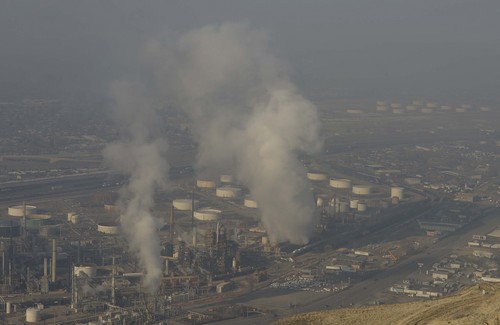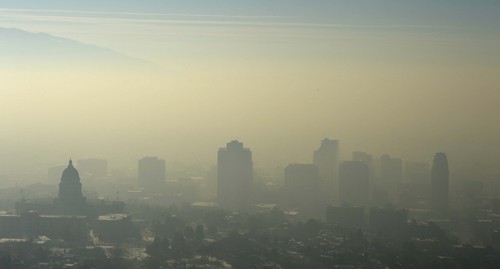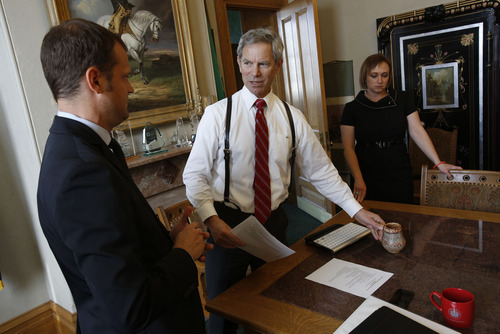This is an archived article that was published on sltrib.com in 2014, and information in the article may be outdated. It is provided only for personal research purposes and may not be reprinted.
Washington • When it comes to air quality, Salt Lake City Mayor Ralph Becker has a message for Utah's leaders: Be more like the Obama administration.
Days away from the opening of the annual legislative session, Becker insists the federal government has been more aggressive on this issue and more open to collaboration than anything he has experienced at home.
"This administration is a true friend. They come to us and ask for input on what we are doing and how they can help. In a state like Utah, it is the state getting in the way of what we are trying to do locally," said Becker, while in Washington, D.C., for meetings of the U.S. Conference of Mayors. He says the criticism applies to other issues, such as climate change, but the mayor has recently made Utah's dirty air his top priority, devoting his entire State of the City address to the topic.
Becker pointed to the state's slow implementation of new federal air-quality standards. He also called on the Legislature to pass a law increasing the amount of money local governments can devote to mass transit. He hopes to spend more on bus service to connect people to light rail or the Sugar House Streetcar. He said that money could also be used as matching funds to secure federal grants for new projects.
"We built the backbone with rail," Becker said, "but we don't have a really good bus system to take them the last mile, the last two miles."
He argues the Utah Transit Authority can't upgrade the bus system with its current budget and that state law makes it hard for Salt Lake City and other local governments to pay for the service they want. He said the state is "an absolute obstacle for us."
And Becker, a former state lawmaker, supports an increase in the gas tax, which cities and counties get a piece of to pay for transportation projects. State legislative leaders have expressed little interest in a tax hike this year, but have promised action on air-quality legislation.
—
Legislature • On Wednesday, a bipartisan Clean Air Caucus unveiled 15 proposals it will promote this legislative session, many of which Becker also supports.
"It is a little disingenuous for the mayor of Salt Lake City to say we are not willing to participate," said House Majority Leader Brad Dee, R-Ogden. "We look forward to being a partner with the city and not a stumbling block."
Dee also said the city should synchronize traffic lights to reduce idling.
Gov. Gary Herbert, a Republican, has made air quality one of his five top priorities this year. His plan is to spend about $18 million encouraging small businesses to reduce emissions and schools to retrofit old buses. And the governor is expected to make more air-quality announcements in his State of the State address Wednesday.
He responded to Becker through spokesman Marty Carpenter.
"Governor Herbert is grateful for his strong working relationship with Mayor Becker on a number of issues, including air quality," he said. "The governor is always happy to discuss issues with the mayor anytime he wants to call."
Becker, a Democrat, says he is not worried about any hurt feelings in the Legislature, which is dominated by Republicans, citing a long working relationship with many members.
"There are always some in the Legislature who don't seem to like what we do in Salt Lake City, I get that," he said. "I've always been able to work well with the Legislature. I don't see a reason why that should change."
He will tailor his message to that conservative audience, noting the need to reduce air pollution isn't just about health or the environment but also the economy.
—
Public priority • "There is no question that our air-quality problems are hurting our economic development in the state," Becker said. "It has clearly risen to the point where the public has made it a top priority."
A new Salt Lake Tribune poll found that 59 percent of respondents were more concerned with air quality than they were five years ago and 67 percent said they think the state should impose stricter emission standards on industries.
The state is still working on its comprehensive air-quality plan to meet federal standards for fine particulate pollution, known as PM2.5. The plan wouldn't take effect for another six years, well past the deadlines in federal law, but it would force changes on the state and private companies to pollute less.
"Thank goodness for the Clean Air Act and the Environmental Protection Agency," Becker said. "We love, in Utah, to talk about those big bad feds, but if it wasn't for the Clean Air Act and the new PM2.5 standards, half of the things about to start wouldn't be happening."
He knows the EPA is one of the federal departments most criticized by Republicans, but he says complaints from Utah officials have seemed to die down lately, particularly this winter, when the state has suffered under one inversion after another, a weather pattern that traps air above the Wasatch Front, which soon becomes loaded with pollution.
Becker urges the EPA to hold firm on the federal standards for air quality.
"I hope for our sake — our health and our prosperity — that they stick to the standards," he said. "They really are necessary to enable us to improve the air quality."
Twitter: @mattcanham







